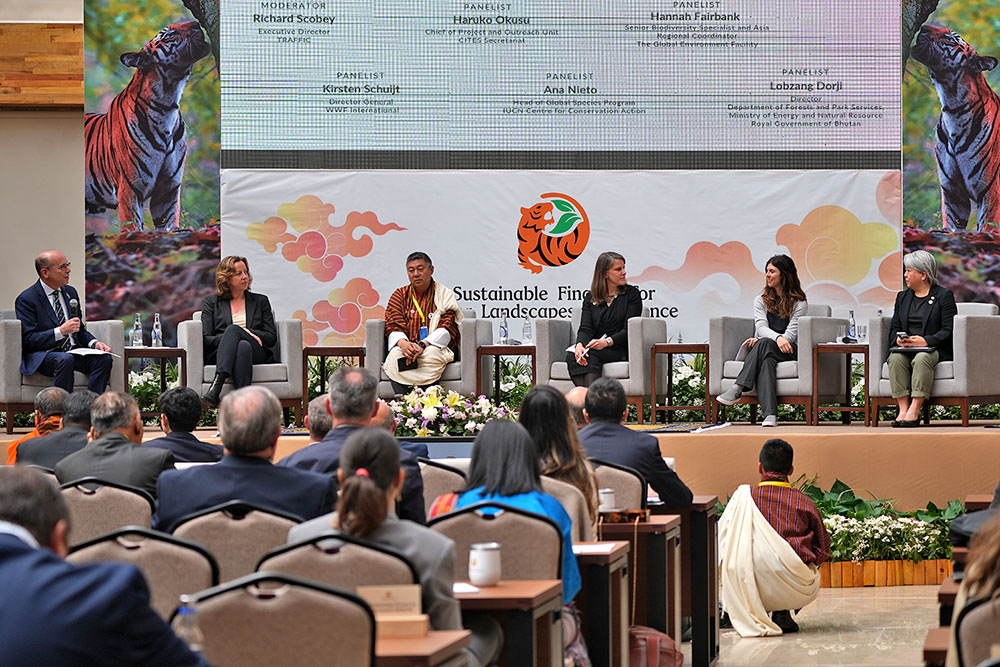
When conservationists and partners came together to discuss sustainable finance for tiger landscapes in Paro yesterday, one key topic of discussion was the involvement of communities in protecting and restoring tiger habitats in the long run.
As countries and conservation partners intensify their efforts to protect the tiger species through biological corridors and protected areas, it has also impacted communities and indigenous people.
The discussion revolved around the need for communities to adjust to sharing and co-existing within tiger habitats.
Sharing biodiversity makes them susceptible to conflicts between humans and wildlife.
To tackle these concerns, conference participants highlighted the importance of broader national and international collaboration, strategic frameworks, and involving communities in conservation efforts to understand and address their issues, which are crucial for a systematic conservation approach.
During the panel discussion, the director-general of WWF International, Kirsten Schuijt, said that tiger conservation should focus on the connectivity between various systems, such as corridors and communities.
She added that financing must incorporate governance systems that engage communities to make the conservation initiatives more relevant.
The director general stressed the reality of human-wildlife conflict, citing the human-elephant conflict in Bhutan as an example where communities face such challenges on a daily basis.
She suggested implementing measures such as fences, insurance schemes, and designing conservation programmes that prioritise listening to the voices of the community for suitable solutions to the rising human-wildlife conflicts.
Explaining Bhutan’s conservation efforts, the director of the Department of Forest and Park services, (DOFPS), Lobzang Dorji, highlighted Bhutan’s commitment to tiger conservation through various nature conservation acts.
He mentioned the declaration of an additional biological corridor last year and the extensive coverage of protected areas, with 52 percent of the forest under protection as some of the initiatives undertaken by the government in Bhutan.
Lobzang Dorji informed the participant about the presence of 131 tigers in 17 dzongkhags, with sightings reported in all dzongkhags last year.
Further, he also mentioned the implementation of a robust tiger protection plan and the utilisation of cutting-edge technology to study tiger movements within the country.
The director said that while people still live within tiger habitats, their livelihoods are well taken care of by the government in Bhutan.
He said that Gross National Happiness (GNH) is a focal point in Bhutan’s conservation efforts, as it balances sustainable development with environmental concerns.
All economic developmental plans, Lobzang Dorji said, are planned carefully to ensure a healthy ecosystem. The approach, he said, ensures that one aspect does not come at the expense of the other.
Some panelists said that as biodiversity continues to decline, it’s important for the world to unite in protecting species from extinction.
They suggested building strong connections with communities as essential for successful species conservation initiatives, using protocols established by tiger range countries.
The panelists also discussed the role of the private sector in conserving tiger species.
Government and relevant stakeholders must engage in dialogue with the private sector to determine how they can contribute effectively to conservation initiatives as a part of wider community involvement in conservation, panelists said.
Penalist Hanna Fairbank, said that the commercial trade of tigers was a growing concern over the years.
To address this issue, she suggested that the partners collect information and regularly report to relevant agencies on tiger conservation, wildlife trafficking, and poaching.
She said that sustainable and legal harvesting of species, along with tiger conservation, should respect the customary practices of communities, as they often share the biodiversity landscape.












